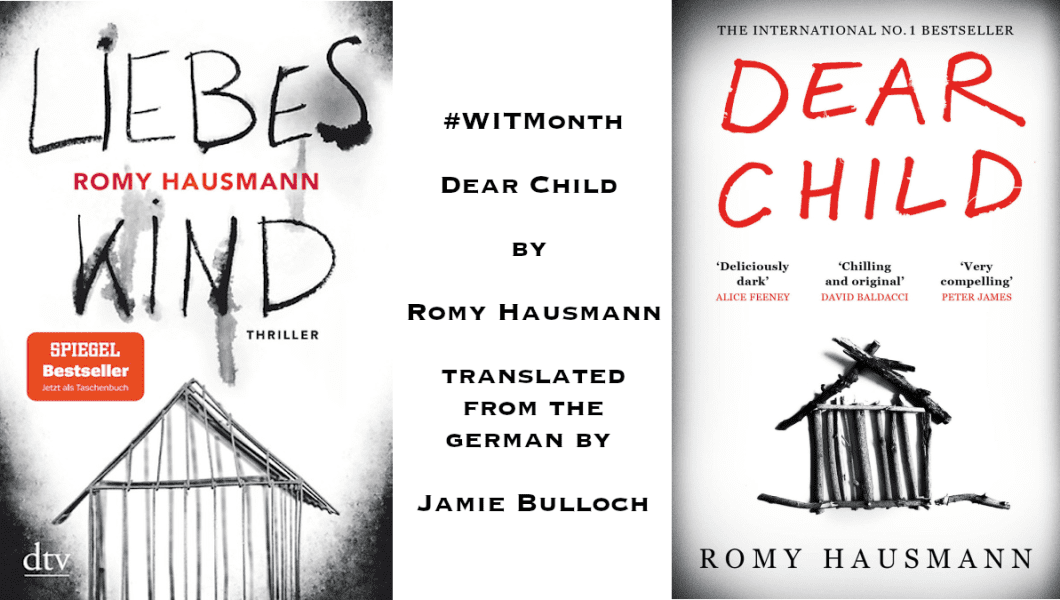Romy Hausmann’s Dear Child begins where other thrillers often end and takes the breaking news event we might hear about—a young woman escaping from captivity with children in tow—as her starting point, before showing us what life was like for them and how they fare once free.
A windowless shack in the woods. Lena’s life and that of her two children follows the rules set by their captor, the father: meals, bathroom visits, study time are strictly scheduled and meticulously observed. He protects his family from the dangers lurking in the outside world and makes sure that his children will always have a mother to look after them.
One day Lena manages to flee – but the nightmare continues. It seems as if her tormentor wants to get back what belongs to him. And then there is the question whether she really is the woman called ‘Lena’, who disappeared without a trace over thirteen years ago. The police and Lena’s family are all desperately trying to piece together a puzzle that doesn’t quite seem to fit.
The paperback of Liebes Kind was everywhere when I was in Frankfurt last year and I regretted not buying a copy almost as soon as I boarded the flight to come home. (note to self: buy an extra wheeled trolley case for books.) Happily, Romy Hausmann’s novel came out here in May, published by Quercus and translated from the German by Jamie Bulloch, so I thought I’d post about it on this last day of Women In Translation Month.
I was interested in this novel because of who gets to tell the story. Dear Child switches between three narrators: Lena, the young woman who was taken and held against her will; Hannah, the daughter born in captivity; and Matthias, Lena’s father, who’s always held out hope that she’d come home ever since her disappearance fourteen years earlier. Their story is further complicated once we make the unnerving discovery that this Lena might not be the same woman who went missing originally.
Dear Child provides an interesting take on what it’s like to be held captive over a long period of time and the physical, emotional and psychological scars this leaves behind. Lena’s description of life in captivity is, understandably, horrific, while Hannah’s narration is decidedly creepy and altogether more disturbing, indicative of the harm done to her while still so young and impressionable. Lena and Hannah’s captor didn’t only hold them prisoner but also imposed further restrictions on them, seeking to control mealtimes, the children’s lessons, and even bathroom breaks.
After having been so confined and limited, it’s fascinating to see how they each adapt to their new-found freedom. Romy Hausmann shows us how they cope in the immediate aftermath, when they’re under the close scrutiny of hospital staff, the police, and Lena’s parents, while also being the subject of unwanted attention from the media and some members of the public, one of them afraid their captor will come back for them and the other missing the only home life she’s ever known.
We also see how Lena’s parents coped in her absence and now again upon her return. It’s fascinating to see how different they are in their approach to each development in the case, and why. One behaves erratically out of love and good intentions, while the other seems cold, almost indifferent. Romy Hausmann shows us the toll the kidnapping takes on everyone and makes you wonder how these shattered people will ever recover any semblance of normal (family) life.
She has us believe that some characters will find a way through this living nightmare. It’s evident in the love and kindness shown by a former flatmate and the (grand)parents but it’s also to be found in what was one of the most surprising, and initially confusing, aspects of the book for me. The way in which Lena tries to provide herself and the children with some temporary respite gave me hope for the future.
Jamie Bulloch has a great feel for the language and his translation is a good one. Dear Child remains true to the original German of Liebes Kind and the story works well even with the language switch, with the characters still sounding as if they belong in the twilight world created in the book.
Romy Hausmann goes beyond the headline news story and all its salacious details to look at the psychological harm done in her case of long-term captivity. Dear Child is a decidedly sinister and creepy thriller, one which left me wanting to read more from the author and this translator in future.
Dear Child by Romy Hausmann and translated from the original German by Jamie Bulloch is published by Quercus Books in the UK. It is available as an audiobook, ebook and in hardback with the paperback due out in January 2021. You can find it at Amazon UK or buy it from Hive instead where every purchase you make helps to support your local independent bookshop.
Romy Hausmann was born in the former GDR and works as a TV freelancer. Dear Child is her thriller debut. You can find her on Instagram.
Jamie Bulloch is a historian and has been working as a professional translator from German since 2001. You can find him on Twitter.
My thanks to the publisher for providing a review copy via NetGalley.






1 Comment